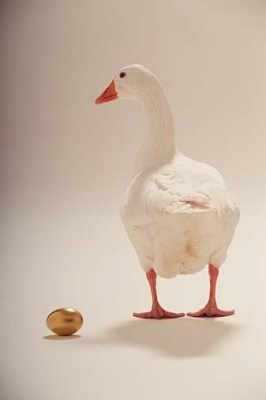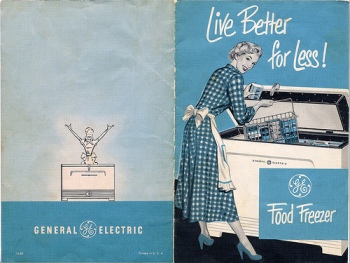 Remember the story Aesop told about the goose and the golden egg? The implications and applications are powerful, so let’s take another look.
Remember the story Aesop told about the goose and the golden egg? The implications and applications are powerful, so let’s take another look.
The fable is about a poor farmer who one day discovered in the nest of his pet goose a glittering golden egg. At first, he thought it must be some kind of trick. But as he started to throw the egg aside, he had second thoughts and took it in to be appraised instead.
The egg was pure gold! The farmer couldn’t believe his good fortune. He became even more incredulous the following day when the experience was repeated. Day after day, he awakened to rush to the nest and find another golden egg. He became fabulously wealthy; it all seemed too good to be true.
But with his increasing wealth came greed and impatience. [click to continue…]
by Andy Wood on April 17, 2009
in Allocating Your Resources, Consumers, Enlarging Your Capacity, Executing Your Plan, Exploring the Possibilities, Five LV Laws, Following Your Passion, Gamblers, Hoarders, Life Currency, Love, LV Alter-egos, LV Cycle, Money, Pleasers, Principle of Abundance, Protecting Your Investment, Waiting
 This week a friend sent me a poignant and compelling image that describes what it’s like to live in a climate or with a spirit of fear. But the image is so strong, I think it describes anybody who feels as though they are in a no-win situation.
This week a friend sent me a poignant and compelling image that describes what it’s like to live in a climate or with a spirit of fear. But the image is so strong, I think it describes anybody who feels as though they are in a no-win situation.
I feel like a grasshopper on the ocean hanging onto a leaf. I cling to the leaf to keep from drowning. If I eat the leaf to keep from starving, I lose my life preserver, and drown.
I’ll tell you later what he learned in the process. But can you relate? [click to continue…]
 It’s a long way from Fairfield, Connecticut, the home of General Electric, to Henderson, Nevada, the home of Zappos. The gap is even wider between their respective products and services.
It’s a long way from Fairfield, Connecticut, the home of General Electric, to Henderson, Nevada, the home of Zappos. The gap is even wider between their respective products and services.
GE is a multinational American technology and services conglomerate. Zappos sells shoes, handbags, and other items online – to the tune of more than $1 billion this year.
Both made the news last week. And it all has to do with their “Bottom 10.”
General Electric is a household name; chances are, you have something in your home with it’s name emboldened on it. The only original company still listed on the Dow Jones Industrial Average, more recently, GE is the company that Jack rebuilt, and one of the most admired in the business world today. Jack Welch determined in the 1980s that GE would be number 1 or 2 in particular industry or leave it completely. He also started the practice of firing the bottom-performing 10% of his managers every year.
Last week the Wall Street Journal reported that GE was sending its century-old appliances business to the auction block. Say it ain’t so! The American company that “brings good things to life” may be bringin’ ‘em from Korea or Sweden or somewhere else. From a sentimental perspective, it hurts. But from a management perspective, it was an overdue decision.
[click to continue…]
 Hoarding’s back.
Hoarding’s back.
I’m sure it never went away, but it’s been back in the news over the last month. Banks are hoarding money. People worldwide are hoarding rice. Myanmar officials and residents are warned about hoarding aid.
People are scared, and when they’re scared, they hoard. OR, somebody else hoards and looks to make a killing off the really scared people.
In a previous post, I mentioned that there are four alter-egos to LifeVestors – consumers, hoarders, gamblers, and codependents. Hoarders are the most unique of these. While consumers live as if there is no tomorrow, hoarders live as if there is a tomorrow, and wherever/whatever it is, it’s gonna be ticked off. Hard. Terrible. And we have to plan for it today.
It’s one thing for literally starving people to make sure they have something to eat for the next few days. It’s another to live with a spirit of fear, even while you’re being wonderfully blessed.
It’s one thing to save and invest for retirement or a rainy day. It’s another thing to create an ongoing bunker mentality based on fear of the future.
[click to continue…]
 Remember the story Aesop told about the goose and the golden egg? The implications and applications are powerful, so let’s take another look.
Remember the story Aesop told about the goose and the golden egg? The implications and applications are powerful, so let’s take another look. This week a friend sent me a poignant and compelling image that describes what it’s like to live in a climate or with a spirit of fear. But the image is so strong, I think it describes anybody who feels as though they are in a no-win situation.
This week a friend sent me a poignant and compelling image that describes what it’s like to live in a climate or with a spirit of fear. But the image is so strong, I think it describes anybody who feels as though they are in a no-win situation.
